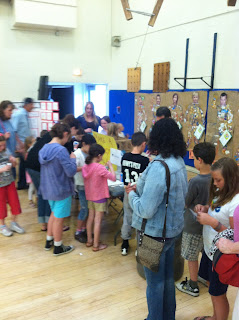Saturday, June 11 was a rainy day, but that didn’t slow down the interest in science! The Science Expo was held in the Middle School Gym from 1:30 to 3:30 and featured science displays from 20 classes from all three elementary schools, as well as displays sent in from individual K-6 students.
Approximately 250 people attended the expo. As one attendee commented, "Science is alive in our district!" And someone else added, "There was a fantastic variety of well-done projects...it’s great to see student excitement for learning."
THE BUBBLE SHOW
The Bubble Show stole the show. Jeff Boyer, science entertainer, taught while he totally captivated his audi- ence. We learned why bub- bles are different colors, what holds them together, and how they interact with wet medi- ums. But mostly, we basked in the magic of bubbles.
HIGHLIGHTS FROM THE EXPO...
-- A tinker-toy trebuchet set up to discover if a light or heavy ball would go further (Kindergarten.)
-- A mural of the planets (1st grade.) A working lemon battery (2nd grade.)
-- An experiment examining if plants grow differently when ex- posed to classical or rock music (3rd grade.)
-- Experiments with different growth mediums for plants (4th grade.)
-- An experiment on the effects of root systems and leaf layers on erosion (6th grade.)
-- Two interactive displays from SUNY New Paltz Professors Aaron Isabel and Thais de Cuny inviting kids to make their own bouncy balls and to observe crickets up close.



